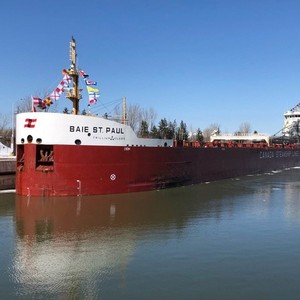CSL to test second generation biodiesel on half its fleet

March 22, 2021
BY The CSL Group
Earlier today, Canada Steamship Lines’ Trillium Class self-unloading ship Baie St. Paul was the first vessel to transit St. Lambert Lock, marking the official beginning of the St. Lawrence Seaway’s 63rd navigation season.
This is the second Seaway Opening for Baie St. Paul, which began operating on the Great Lakes in 2013 as the first in a new class of smarter, cleaner and more efficient ships.
During the Seaway Opening ceremony, Louis Martel, president and CEO, The CSL Group, announced that CSL will be testing second generation biodiesel on half of its fleet over the course of the 2021 navigation season—a first for the Great Lakes shipping industry. These tests are a follow-up to the successful trials of B100 biodiesel fuel on the main engines of two CSL ships last year.
Advertisement
Advertisement
“Replacing fossil fuel with biodiesel on vessels requires no modification of existing equipment and provides a viable carbon neutral fuel source over its lifecycle, Martel explained. “This is what makes biofuels a very attractive option to reduce our environmental footprint, and we are eager to continue testing them and other solutions that offer the potential to contribute to cleaner air and waterways.”
CSL has aligned with Canada’s nationally determined targets under the Paris Climate Agreement with a goal to reduce greenhouse gas emissions by 35 percent below 2005 levels by 2030.
To achieve this ambitious objective, CSL is taking concrete actions by building more efficient ships, investing in R&D and innovation, and exploring and testing new technologies, fuels and digital solutions.
Among them, CSL is building a new 26,000 DWT diesel-electric self-unloading ship, purpose-built for Windsor Salt with the most advanced environmental technologies. The vessel will service Windsor Salt’s Mines Seleine located in the eco-sensitive marine environment of the Magdalene Islands.
Advertisement
Advertisement
“The pace of transformation and digitalization we are witnessing in shipping today is a game-changer, and we are fully committed to modernizing and investing in the long-term viability, sustainability and success of our company and sector,” said Louis Martel.
“Marine transportation continues to be the most efficient, reliable and eco-responsible choice for shipping large cargos, and investments made today in green solutions will have positive impacts for generations to come.”
Related Stories
The USDA’s Risk Management Agency is implementing multiple changes to the Camelina pilot insurance program for the 2026 and succeeding crop years. The changes will expand coverage options and provide greater flexibility for producers.
EcoCeres Inc. has signed a multi-year agreement to supply British Airways with sustainable aviation fuel (SAF). The fuel will be produced from 100% waste-based biomass feedstock, such as used cooking oil (UCO).
SAF Magazine and the Commercial Aviation Alternative Fuels Initiative announced the preliminary agenda for the North American SAF Conference and Expo, being held Sept. 22-24 at the Minneapolis Convention Center in Minneapolis, Minnesota.
Saipem has been awarded an EPC contract by Enilive for the expansion of the company’s biorefinery in Porto Marghera, near Venice. The project will boost total nameplate capacity and enable the production of SAF.
Global digital shipbuilder Incat Crowther announced on June 11 the company has been commissioned by Los Angeles operator Catalina Express to design a new low-emission, renewable diesel-powered passenger ferry.
Upcoming Events










